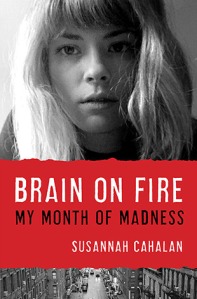My most recent read was a book that was highly recommended to me by a friend, so, naturally, I chose it for my newspaper’s book club.
Brain on Fire by Susannah Cahalan documents Cahalan’s descent into “madness” and her ultimate diagnosis with a rare auto-immune disorder.

From Goodreads page
Cahalan was a reporter (not much younger than I am now) at the New York Post when she started acting differently. She ultimately began having seizures and what appeared to be psychological breaks.
As I was reading about her symptoms, it sounded like some weird love child of schizophrenia, epilepsy and bipolar disorder. It wasn’t pretty.
Cahalan doesn’t have much memory of the month she spent in the hospital before finally being diagnosed (essentially on a fluke) with the auto-immune disease.
One million dollars (PLUS) later and with a treatment plan in place, Cahalan began the road to recovery.
The book documents Cahalan’s hospital stay through her own medical records, interviews with her parents and boyfriend (all of whom spent a ridiculous amount of time by her side and supporting her), and interviews with her physicians and experts to get the full story.
Essentially, Cahalan’s brain was attacking her body. It could happen again. Doctors have yet to figure out why it happened the first time.
As amazing as it is that Cahalan is now fully recovered (still working at the Post) and an author, with another book due out next year, Brain on Fire is also terrifying.
This could essentially happen to anyone, for no reason. She was considered by some of her doctors to be mentally ill and they wrote her off. Without some of the doctors on the case at one of the best hospitals in the country, and without insurance paying for much of her medical care, Cahalan could have been sent to a mental institution. For no reason.
That very issue is something Cahalan addresses toward the end of the book. How many people have been diagnosed with mental health issues that may actually have some sort of auto-immune disease? It’s a question we may never totally have the answer to.
In the meantime, you should read Brain on Fire. It’s a relatively quick read and incredibly engaging and educational.
